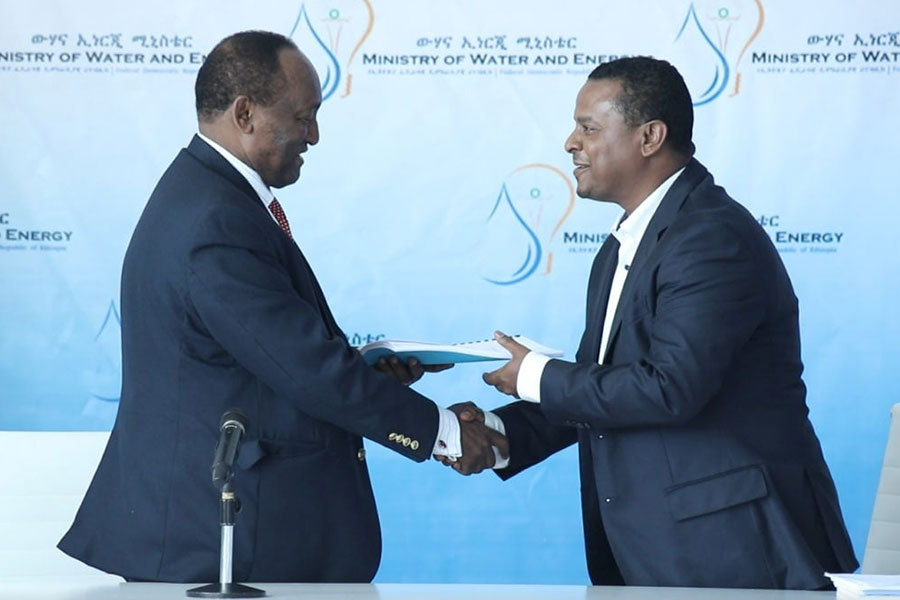
News Analysis | Jul 03,2021
Two months are left before Safaricom Ethiopia launches what will be the country's first private telecom services, but an infrastructure sharing agreement with the state-owned Ethio telecom remains inconclusive.
Negotiations between the two companies' executives are ongoing, but they have yet to settle on terms, people close to the matter disclosed to Fortune.
Ethio telecom had initially offered to lease Class I towers (located in dense urban areas) for a little over 2,000 dollars a month for each tower, excluding tax. Its executives have expressed their desire to share up to 80pc of the 7,100 towers and power supplies and part of its 22,000Km fibre optics network, according to Tariku Demissie, chief technology officer of Ethio telecom. Safaricom has thus far requested to use 1,000 tower sites.
Ethio telecom's initial offer has been revised to narrow the price gap between the terms envisioned by the two companies, says Tariku.
"[Negotiations] will be completed shortly," he told Fortune. "We'll sign the contract."
Safaricom technicians have begun surveying the sites to identify how to co-locate on the towers. Backbone transmission sharing, which connects across city infrastructures, is also underway. Safaricom has placed requests on the sites it would like to rent out, Tariku disclosed.
The Ethiopian Communications Authority (ECA), established in 2019, sets an ex-ante tariff of 1,700 dollars for Class I tower rental. Ethio telecom's initial offering of 2,070 dollars was presented assuming that two new telecom operators would be entering the market. The Authority is responsible for mediating negotiations if any dispute arises between operators. It may intervene at its discretion or, if requested by a party to an access agreement to determine whether the infrastructure sharing, collocation charges and compensation are cost-based, reads a telecommunications infrastructure sharing and collocation directive issued last year.
The Authority has not received a mediation request for a dispute between the negotiators thus far, according to Balcha Reba, director-general of the ECA.
Representatives of Safaricom Ethiopia Plc were not available for comment despite repeated efforts from Fortune.
Safaricom could face consequences if negotiations do not wrap up in time. The company could be forced to deploy more of its own towers. This would delay commercial operations but could save costs otherwise incurred for infrastructure sharing. The delay would entail the installation of redundant duplicate towers covering the same area.
The telecom operator, which paid 850 million dollars for a 15-year license, is moving ahead with its infrastructure development project, having contracted Huawei and Nokia. Nokia will carry out 60pc of the project. The operator wants to develop tower infrastructures on building-tops and import materials for its operations. Safaricom has also announced the construction of a 100 million dollar modular data centre in Addis Abeba.
Countries with multiple telecom operators are increasingly calling for the sharing of infrastructure to avoid coverage duplication and environmental impacts. For instance, in Denmark, home to over eight operators, the government has pushed operators to share existing infrastructure for years. The results have been increased coverage and reduced prices while competition does not seem to have been affected negatively, according to a report from the Danish Energy Agency published by the International Telecommunications Union in 2017.
The operator has nine months to launch its commercial operations based on the license agreement signed between the government and Safaricom. It was awarded a provisional license at the end of last May, while full permission was granted the following month. Failing to meet the deadline in April would entail a fine for the company. However, the operator, which will be using the "07" prefix for mobile calls, is not obligated to launch its services across the country but in defined economic zones.
The government's decision to prohibit third-party infrastructure operators from entering and launching mobile financial services was cited as one of the main reasons global telecom operators shied away from the race to acquire the country's first-ever private telecom license. Officials decided to include mobile financial services in the second offer, hoping to attract more operators and better offers.
The process to award the second license has been halted for an indefinite period after receiving "concerns and requests" from potential bidders to delay the process.
PUBLISHED ON
Jan 29,2022 [ VOL
22 , NO
1135]

News Analysis | Jul 03,2021

Radar | Oct 14,2023

Commentaries | Dec 28,2019

Radar | Apr 04,2020

Fortune News | Apr 09,2022

Dec 22 , 2024 . By TIZITA SHEWAFERAW
Charged with transforming colossal state-owned enterprises into modern and competitiv...

Aug 18 , 2024 . By AKSAH ITALO
Although predictable Yonas Zerihun's job in the ride-hailing service is not immune to...

Jul 28 , 2024 . By TIZITA SHEWAFERAW
Unhabitual, perhaps too many, Samuel Gebreyohannes, 38, used to occasionally enjoy a couple of beers at breakfast. However, he recently swit...

Jul 13 , 2024 . By AKSAH ITALO
Investors who rely on tractors, trucks, and field vehicles for commuting, transporting commodities, and f...

Jul 12 , 2025
Political leaders and their policy advisors often promise great leaps forward, yet th...

Jul 5 , 2025
Six years ago, Ethiopia was the darling of international liberal commentators. A year...

Jun 28 , 2025
Meseret Damtie, the assertive auditor general, has never been shy about naming names...

Jun 21 , 2025
A well-worn adage says, “Budget is not destiny, but it is direction.” Examining t...